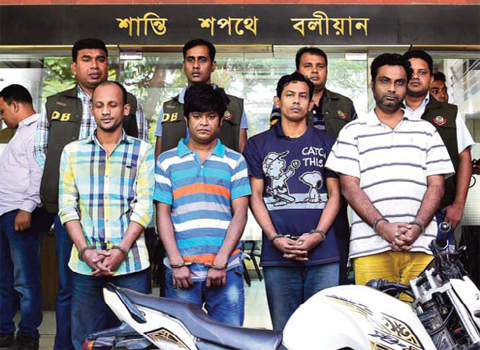 DHAKA: Bangladesh police escort (from left) Minhajul Abedin Russel, Russel Chowdhury, Shakhawat Hossain and Tamjid Ahmed Rubel, alongside a motorbike police suspect of being used in the killing, after they were arrested over the murder of Italian citizen CesareTavella. — AFP
DHAKA: Bangladesh police escort (from left) Minhajul Abedin Russel, Russel Chowdhury, Shakhawat Hossain and Tamjid Ahmed Rubel, alongside a motorbike police suspect of being used in the killing, after they were arrested over the murder of Italian citizen CesareTavella. — AFPDHAKA: Bangladesh made its first arrests over an Italian aid worker's murder as authorities insisted yesterday the killing was a plot by government opponents to trigger anarchy and not the work of the Islamic State group. Police paraded four people detained for the killing of 50-year-old Cesare Tavella late last month, along with a motorbike said to have been the getaway vehicle.
The killing near Dhaka's diplomatic zone was the first of a series of attacks to be claimed by Islamic State (IS) and was followed days later by the gunning down of a Japanese farmer in northern Bangladesh. A weekend bombing of the capital's main Shiite shrine, which killed one person and wounded dozens more, has further heightened the fears of minorities living in the mainly Muslim but officially secular nation.
But although that attack was also claimed by IS, the government responded by denying the extremist group was active in Bangladesh and instead rounded up dozens of Prime Minister Sheikh Hasina's opponents. Speaking after the four suspects were brought in handcuffs before the media, Dhaka police said they had all admitted killing Tavella on "the orders of a so-called big brother who offered them money".
"They carried out the murder to embarrass the government, to put the government under pressure and to create anarchy," Dhaka police commissioner Asaduzzaman Mia told reporters. "So far what they've admitted to us is that they were not specifically targeting Cesare Tavella but their aim was to kill any white-skinned foreigner. "Their big brother wanted to prove that Bangladesh is not safe for foreigners and if they could prove that, then it would put pressure on the government." Police described two of the suspects as drug addicts who have previous criminal convictions, while another was a drug-dealer and the fourth was "a cold-blooded killer".
Mystery 'big brother'
They did not elaborate on the identity of the "big brother" said to have ordered the killing of Tavella, who worked for a faith-based Dutch charity. But Mia pointed a finger at the opposition and insisted the murder could not have been carried out by IS or by another Islamist group behind the recent killings of atheist bloggers.
"There is no militant connection with this killing. This is entirely a local group which wants to make political capital," he said. "We all know the identity of those people who have been trying to create anarchy in the country since January," he added in reference to protests led by the main opposition Bangladesh Nationalist Party (BNP) which began at the start of the year.
His comments echoed those of Home Minister Asaduzzaman Khan Kamal who told reporters after the shrine blast that "the IS organization does not exist in Bangladesh". Bangladesh prides itself on being a mainly moderate Muslim nation but the gruesome killings of a series of atheist bloggers this year have rocked the nation and sparked a crackdown on local hard-line Islamist groups.
After the foreigners' murder, international schools closed temporarily and embassies restricted their diplomats' movements, while Australia's cricket team cancelled a planned tour over security concerns. The government has consistently blamed the BNP and its main Islamist ally Jamaat-e-Islami for the unrest which has plagued Bangladesh since their refusal to take part in a January 2014 general election.
The BNP's secretary general Fakhrul Islam Alamgir declined to comment specifically on the remarks by Mia but said the party had always opposed deadly political violence. "We need national unity to confront any form of terrorism in our country. We've condemned all acts of terrorism and so this should be not be used to harass the opposition," Alamgir said. After the attack on the Shiite shrine, a former BNP lawmaker and several senior BNP and Jamaat officials were detained. Police said the arrests were related to previous unrest and not linked to Saturday's blast. - AFP









